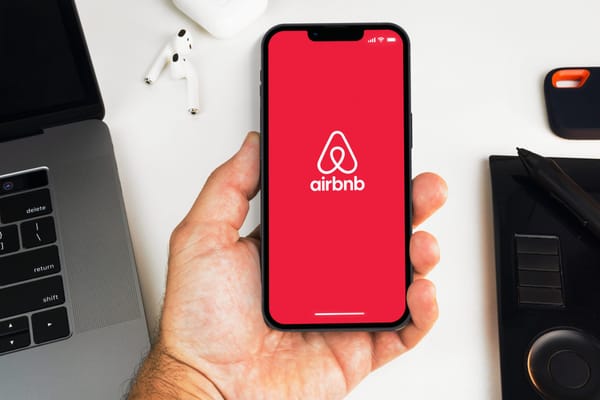6 Top Vacation Rental Property Management Companies and Their Services

Vacation rental management plays an important role in the short-term rental business. Behind every income-generating property is a dedicated manager who ensures guests receive stellar service and that the listing performs well in ratings and reviews across booking platforms.
Sometimes, hosts can’t handle this on their own. In such cases, they can partner with reliable management companies specializing in vacation rentals to keep their properties well-maintained and maximize bookings.
In this article, we’ve compiled a list of some of the most popular property management companies. Also, we’ll guide you on what services to expect from property managers.

6 Top Property Management Companies In the U.S.
The vacation rental management business thrives when managers with hands-on experience take care of your property. If you're considering hiring a company but aren't sure where to begin your research, you can start with some of the most well-known names in the industry.
1. Vacasa
Vacasa manages over 44,000 vacation homes across North America, with operations spanning the U.S., Canada, Mexico, Belize, and Costa Rica. Their services include full-service vacation rental management, covering marketing, booking, guest communication, housekeeping, maintenance, and dynamic pricing to maximize revenue.
Fees vary widely, ranging between 10% and 50%, and require a personalized quote for specifics. In December 2024, Vacasa announced a strategic merger with Casago, further expanding its property portfolio and enhancing its service offerings.
2. Evolve
Evolve manages over 24,000 properties across 750 markets in North America. The company charges a straightforward 10% booking fee, making it a budget-friendly option for property owners.
Evolve specializes in marketing and booking services, offering professional photography, listing creation, and guest communication. However, on-the-ground operations, such as cleaning and maintenance, are the responsibility of their local partners. They recruit and vet local cleaning professionals to work with vacation rental owners.
3. iTrip
iTrip manages properties across popular vacation destinations in North America. While detailed fee information isn't publicly available, iTrip offers full-service property management, including listing management, marketing, guest communication, cleaning, maintenance, and dynamic pricing.
Known for its localized approach, iTrip tailors its services to meet the specific needs of each property’s market, ensuring a customized experience for both property owners and guests.
4. Awning
Awning offers property management services across all 50 U.S. states. Fees start at 10% of the revenue. Their comprehensive services include listing creation, marketing, guest communication, housekeeping, maintenance, and dynamic pricing to optimize revenue.
They also provide additional services like furnishing your rental property, insurance that provides coverage specifically designed for vacation rental properties, and property acquisition assistance through market research and pairing you with real estate agents.
5. AvantStay
AvantStay operates in high-end vacation destinations across the U.S., catering to luxury travelers. While their fee structure is not publicly disclosed, they provide a comprehensive range of services, including property design and furnishing, listing creation, marketing, guest vetting, communication, housekeeping, maintenance, and a full-service brokerage division that assists clients.
AvantStay stands out by focusing on luxury group travel, delivering curated and unique experiences that elevate stays in premium properties.
6. MyHouseMgmt
You can also choose a company that operates at a local level. The upside is that they know the local market very well.
MyHouseMgmt operates in select markets, with a strong connection to New York, making it a trusted option for property owners in the region. They focus on delivering essential services such as guest communication, booking management, housekeeping, and property maintenance. Their reputation for prioritizing personalized service and attention to detail makes them stand out.

What Do Vacation Rental Property Managers Do?
Many hosts, or property owners, choose to manage their vacation rental property by themselves instead of hiring a property manager. This decision often stems from a desire to maintain affordability and direct control over their rentals, including setting prices. On the other hand, self-management can be an extensive and time-consuming task.
If you hire a manager, you need to understand what services they will provide.
Likewise, if you decide to do your own management, there are a few essential tasks you will need to undertake for success:
1. Crafting a Vacation Rental Management Strategy
The first step in managing your short-term rental business is coming up with a unique management strategy. Your strategy should be based on the following factors:
- Your monthly expenses
- Profit margin goals
- Your ideal occupancy rate
- Your ideal guest
- Marketing strategy
- Business goals
Identifying Key Selling Points
Start by making a list of your rentals’ location, size, and amenities. Is your property an urban apartment or a cottage by the beach? The type of your property and its location are the first factors to take into account when shaping your unique offer.
Set Out Your Business Goals
After you’ve identified the unique features of your listing and the type of guest it’s likely to attract, you can begin planning your short and long-term business goals. What is the average monthly occupancy rate you’d like to hit for your rentals? Bear in mind that your occupancy rate will vary throughout the year based on when your high and low seasons take place.
You will need to try and align your occupancy rate goals with your profit margin goals. Make sure you know the minimum number of days that your vacation homes need to be booked to cover your set monthly expenses, so you’re not making a loss.
2. Pricing Your Rentals
When it comes to setting a fee for your rentals, it’s a good idea to adopt a dynamic pricing strategy. Your monthly rental fees will sometimes fluctuate depending on the time of the year, the season, current events taking place, and the prices your competitors are charging.
Estimate Your Expenses
First, write a detailed list of your monthly business expenses. You want to make sure your monthly earnings exceed your expenses and also generate a profit. If you’re unsure what profit margins you should be aiming for, consult with a financial advisor who can guide you.
Also, take a look at what competitors in your area are charging for similar properties.
Research Your Competitors’ Rates
To start off the pricing process, take a look at the rates that your competitors have set for their listings. Pay attention to their rate in relation to their rentals’ size and amenities to get an idea of the price range to work from.
3. Ensuring Flawless Guest Communication
One of the most essential aspects of vacation rental property management is communication with your guests. Excellent guest communication is vital for ongoing business. It can affect your overall host rating and reviews of your property listing.
4. Arranging Cleanings and Maintenance
Each time a guest checks out of your rental, you will need to arrange for cleaning to take place before your next guests check-in. Scheduling regular cleanings will ensure your property is in pristine condition for your guests.
In addition to this, any damage to the property or amenities will need to be handled by a maintenance team. It’s in your best interest to schedule any repairs or maintenance work as quickly as possible, so it doesn’t affect your guests’ stay.
Outsource Cleaning and Maintenance
As the property manager, you will be responsible for outsourcing and hiring cleaning and maintenance teams for your property. Consider reaching out to local teams from several companies, and getting quotes for their services to find the best rate.
Conduct Property Inspections
Conducting regular property inspections and safety checks of your listing can help to prevent future hazards or headaches. Try to work with a vacation rental property management checklist when doing an inspection so as not to miss out on anything important.
5. Marketing and Promoting Your Rentals
Rental owners spend around $1,150 annually on advertising, emphasizing the appeal of their properties in popular locations that are within a few hours’ drive of a city. But as many as 94% of homeowners think they could be doing more to market their properties in these desirable vacation destinations.
The vacation rental industry is competitive, and only using one marketing strategy is not enough to make your listing stand out. It’s a good idea to market across various platforms and top booking sites to maximize your listing’s visibility.
Make Your Listing Shine
Make sure that your listing descriptions are detailed and appealing. Include all the unique features of your property and the amenities it offers, as well as nearby places of interest. Use high-quality professional photos to visually market your listing to guests.
Market Your Business Via Social Media
Once you have listed your property on the primary vacation rental platform, set up business pages on social media channels like Facebook and Instagram.
Create Your Own Website
If you have multiple properties it’s ideal to have your own business website where you can drive direct bookings. To strengthen your online presence, make sure your social pages link back to your website.
6. Automating Your Property Management With Vacation Rental Software
Most professional hosts and property managers use vacation rental property management software to automate their work operations, as part of effective business management. Automating your rental business will increase your occupancy rate. Also, you will be able to cut down time spent on repetitive tasks, like guest messaging, by up to 75%.
Everyday tasks like the ones below require constant attention and would benefit from being automated:
- Guest messaging
- Writing and sending reviews
- Arranging check-ins and check-outs
- Booking cleaning and maintenance teams
Other functionalities that would simplify property management include being able to access all of your booking channels on the same interface via a channel manager and having a unified calendar that updates and syncs your booking dates from multiple platforms.
Many hosts are already using iGMS, an all-in-one vacation rental software for professional hosts. By using iGMS you can rest assured that your essential work operations are taken care of, leaving you more time to focus on upscaling the business. Our software has helped many hosts grow their rental businesses, and their customer satisfaction is confirmed by our 4.6 out of 5-star rating on Capterra.

Pros And Cons Of Hiring a Property Management Company
If you find that you’re feeling overwhelmed by the various management day-to-day tasks and responsibilities, another option may be to hire an independent manager or a management company.
While it may put your mind at ease knowing that you have a person or a company managing your property management business, keep in mind that you’ll likely be paying more for their services in comparison to a software solution.
On average, property managers in the US charge between 20% and 40% of the monthly rental income as their management fee, depending on the property’s size and location.
Managers will charge vacation rental property management fees, so you’ll pay a monthly or annual service fee to them. On top of this, you will need to spend time finding a manager whose services match your business needs and charges a fee you are happy to pay.
The best option for finding a manager would be to shop around and get various quotes, before making a decision. Remember to always check what services the quoted management fee covers, and if any other charges will be added on top of this fee.
Final Thoughts
Vacation rental property management may seem simple enough when you start out. However, it can quickly become quite an extensive responsibility as your business grows, and you take on more rentals and guests.
You may decide at one point to outsource property management by paying someone else to do property management services for you.
Whether you choose to manage your properties as a host or hire a company, automating tasks helps to relieve hosts and managers of day-to-day pressures and stay in control of your rental listings.
Hosts using iGMS see a 73% reduction in manual operations and a 23% revenue increase with direct bookings.






